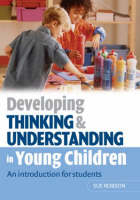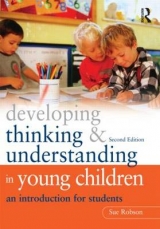
Developing Thinking and Understanding in Young Children
An introduction for students
Seiten
2006
Routledge (Verlag)
978-0-415-36108-8 (ISBN)
Routledge (Verlag)
978-0-415-36108-8 (ISBN)
- Titel erscheint in neuer Auflage
- Artikel merken
Zu diesem Artikel existiert eine Nachauflage
Combines theoretical approaches to thinking skills with real-life observations of young children. This work provides insights from the disciplines of neuroscience and psychology to help classroom activities become useful. It is intended for those looking to understand young children's thinking.
Invaluable for anyone looking to understand young children’s thinking, this essential textbook helpfully combines introductions to theories about thinking with observations from real-life practice. The book explores underlying theories behind topics such as:
the relationship between nature and nuture
models of cognitive development, with ideas from key thinkers such as Piaget, Vygotsky and Bruner
basic neuroscience and its application to early childhood
the social, emotional and cultural context of children’s development
emotional intelligence
language and thought, including the use of motherese and children’s talk in pretend play
whether children can think philosophically.
The author accompanies every topic with observations from the classroom, supported by her own critical analysis linking theory to practice throughout.
Invaluable for anyone looking to understand young children’s thinking, this essential textbook helpfully combines introductions to theories about thinking with observations from real-life practice. The book explores underlying theories behind topics such as:
the relationship between nature and nuture
models of cognitive development, with ideas from key thinkers such as Piaget, Vygotsky and Bruner
basic neuroscience and its application to early childhood
the social, emotional and cultural context of children’s development
emotional intelligence
language and thought, including the use of motherese and children’s talk in pretend play
whether children can think philosophically.
The author accompanies every topic with observations from the classroom, supported by her own critical analysis linking theory to practice throughout.
1. How Can We Think about Young Children's Thinking? 2. Theories of Cognitive Development: Learning to Think and Thinking to Learn 3. The Social, Cultural and Emotional Contexts of Thinking and Understanding 4. The Developing Brain 5. Knowing about the Mind: Theory of Mind, Self-Regulation and Metacognition 6. Observing, Describing and Documenting Children's Thinking and Understanding 7. Language, Communication and Thought 8. Knowing about the World: The Development of Children's Concepts 9. Young Children's Visual Thinking 10. Approaches to Developing Young Children's Thinking and Understanding
| Erscheint lt. Verlag | 6.4.2006 |
|---|---|
| Zusatzinfo | 10 Line drawings, black and white; 1 Halftones, black and white |
| Verlagsort | London |
| Sprache | englisch |
| Maße | 174 x 246 mm |
| Gewicht | 431 g |
| Themenwelt | Sozialwissenschaften ► Pädagogik |
| ISBN-10 | 0-415-36108-7 / 0415361087 |
| ISBN-13 | 978-0-415-36108-8 / 9780415361088 |
| Zustand | Neuware |
| Informationen gemäß Produktsicherheitsverordnung (GPSR) | |
| Haben Sie eine Frage zum Produkt? |
Mehr entdecken
aus dem Bereich
aus dem Bereich
Wissenschaftssprache in Regeln und Übungen
Buch | Softcover (2022)
UTB (Verlag)
15,00 €
100 Kreative denken Lernen neu
Buch | Softcover (2023)
Franz Vahlen (Verlag)
59,00 €



